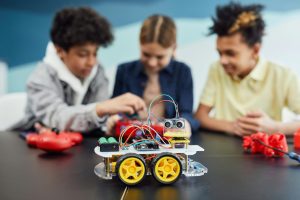The Future of Skill Development in a Rapidly Changing World
In today’s world, change is the only constant. With the rapid development of technology, the job market is constantly evolving, and new skills are in demand. In order to thrive in this ever-changing landscape, individuals need to continuously adapt and develop new skills. This is where skill development comes into play. In this article, we will explore the future of skill development in a rapidly changing world and how it can impact our lives and careers.
The Changing Landscape of the Job Market
Gone are the days when one could rely on a single set of skills for their entire career. With the rise of automation, artificial intelligence, and other advanced technologies, the job market has changed drastically. Traditional jobs are becoming obsolete, and new roles are emerging. To stay relevant and competitive, individuals need to constantly upgrade their skills and acquire new ones.
The Importance of Skill Development
Skill development is the process of acquiring new or enhancing existing skills. It not only helps individuals stay relevant in the job market but also enables them to perform better in their current roles. In a rapidly changing world, the ability to learn new skills quickly and efficiently is essential for personal and professional growth.
Moreover, skill development is not limited to technical skills. Soft skills such as communication, leadership, and adaptability are also crucial for success in the modern workplace. These skills are transferable and can be applied to various roles and industries, making individuals more versatile and valuable to employers.
The Future of Skill Development
With the rapid advancements in technology, the future of skill development is both exciting and challenging. On one hand, automation and AI can eliminate certain jobs, but on the other hand, they can create new roles that require new skills. This means that individuals need to continuously adapt to meet the demands of the evolving job market.
Emphasis on Lifelong Learning
In the past, education was seen as a one-time event that prepared individuals for a specific career. However, with the pace of change in today’s world, learning cannot stop after graduation. Lifelong learning has become crucial for staying competitive in the job market. This includes formal education, as well as informal learning through online courses, workshops, and networking opportunities.
Flexibility and Adaptability
With the rise of remote work and the gig economy, the traditional 9-5 job is no longer the norm. This calls for individuals to be adaptable and flexible in their approach to work. This includes having a diverse set of skills that can be applied to different roles and industries. By continuously developing new skills, individuals can stay agile and easily transition into new opportunities.
Personalized Learning
In the future, skill development will not be a one-size-fits-all approach. With the help of technology, learning can be personalized to individual needs and preferences. This will enable individuals to learn at their own pace, in their preferred learning style, and on topics that are relevant to their career goals. Personalized learning will also make skill development more accessible and affordable for everyone.
Conclusion
The future of skill development is intertwined with the rapid changes in our world. As the job market continues to evolve, individuals need to invest in their personal growth through continuous learning and skill development. By staying adaptable, flexible, and open to new opportunities, individuals can stay ahead of the curve and thrive in a rapidly changing world.
The key takeaway is that skill development should not be seen as a one-time event, but rather a continuous process that extends throughout one’s career. As technology continues to advance and transform the job market, being open to learning and acquiring new skills will be vital for success.











